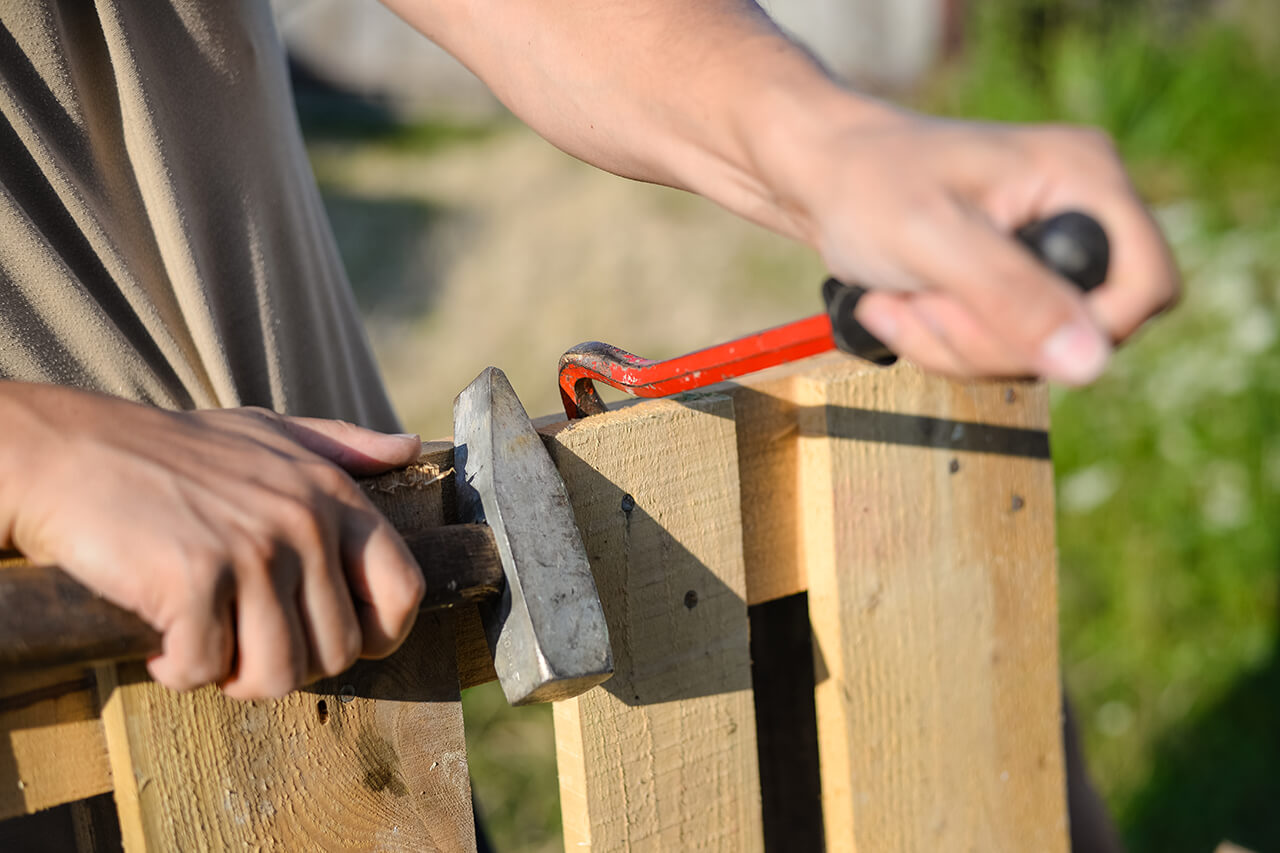How Much Does Deer Fence Installation Cost in 2025?
Deer fence installation averages $1,400 to $7,000


Deer fence installation costs $4,200 on average, ranging from $600 to $11,000.
Deer fences constructed from either plastic mesh, metal wire, chain-link, or solid wood offer different levels of durability.
Labor makes up half of total costs, with professional rates between $30 and $60 per hour.
Installing a deer fence safeguards landscaping, increases security, and can improve property value.
This article was updated using automation technology and thoroughly reviewed for accuracy by HomeAdvisor Editor Ryan Noonan.
Deer fence installation costs $4,200 on average, and homeowners spend an average of $1,400 and $7,000. If you’re only fencing a small area and don’t mind a no-frills look, costs can dip to $600. On large, landscaped lots that call for a sturdier, more attractive fence, the bill can climb to $11,000. Labor accounts for half of the total, and fence contractors charge $30 to $60 per hour.
Deer Fence Cost Factors
When you’re budgeting for a deer fence, factor in material, length, height, labor, and any add-ons.
Fence Length
The more ground you want to protect, the more you’ll spend. Extra length means extra material and labor. If you want to protect a large and varied property from deer and other animals, metal wire or plastic wire fences are among the most affordable. They ship in 100-foot partitions. For chain-link and wood fences, you pay per linear foot for materials plus an hourly rate for labor.
Fence Height
Because deer are strong jumpers, most fences stand at least six feet tall—some reach eight, 10, or even 12 feet. The taller the fence, the higher your material and labor costs.
Materials
Material prices swing widely, from $0.85 to $45 per linear foot. If appearance isn’t a priority, you can opt for the lower-priced options.
| Fence Material | Average Cost Range Per Lin. Ft. |
|---|---|
| Metal wire | $10–$15 |
| Plastic wire | $6–$10 |
| Chain-link | $10–$20 |
| Solid wood | $15–$30 |
Metal Wire
Woven wire fences cost $10 to $15 per linear foot. They come in rolls, which simplifies the installation process. Metal wire rolls unfurl to 100 feet each at varying heights. Metal wire is the most common material for a deer fence. They last 30 years and are nondescript and inexpensive.
PVC-coated metal wire fences are better for inclement weather. Metal wire may not be the most aesthetically pleasing choice, but it is functional and long-lasting. Most metal wire fencing material has an opening size of two inches.
Plastic Wire
You’ll pay $6 to $10 per linear foot of plastic wire. Like metal wire, plastic wire comes in rolls of 100 feet at varying heights with two-inch openings. Plastic wire deer fence material tends to be UV-resistant, though long-term sun exposure could weaken it.
Plastic wire lasts 15 to 25 years on average, less than metal wire material. It is an extremely economical option, but it is also easier for deer to chew through, so you may have to absorb fence repair costs sooner.
Chain-Link
If your budget allows for a slightly higher deer fence installation cost, you may choose to invest in chain-link fences. Chain-link fences cost $10 to $20 per linear foot and offer a good lifespan of 30 years without requiring significant regular maintenance. Color-coated chain-link fencing can cost up to $8 more per linear foot.
Chain-link fencing is functional and long-lasting, effectively dissuading deer from entering your property if you choose a high enough fence. As it’s more durable, you may not need to pay for chain-link fence repairs as frequently as plastic wire. It is also an aesthetic upgrade in most cases, especially if you invest in more attractive coatings.
Solid Wood
Solid wood fences are among the most expensive options. A standard wood fence averages $15 to $30 per linear foot, including labor and materials, though some may cost up to $45 per linear foot. Choosing a solid wood privacy fence as your primary deer deterrent offers several benefits.
These fences are attractive and suit most outdoor décor schemes. You can paint or stain it for more aesthetic appeal. Also, you won’t have to go quite as high as other fence types because deer can’t see through solid wood and are wary of encountering predators. However, solid wood fences are more difficult to install compared to other fence types and are less durable than metal wire.
Opening Size
Mesh opening size affects both how well the fence keeps deer out and how much it costs. Smaller openings provide superior protection but require more material and drive up expenses. Mesh sizes range from two to four inches; smaller openings cost 25% more than similar fence designs with larger openings.
It may be worth investing in tighter designs if your property encounters a lot of deer, while more open landscapes may allow for more economical fences with larger openings. Local fencing companies can recommend the best option for your property and budget.
Strength
Stronger materials cost more up front but deliver better deer deterrence, lower maintenance, and a longer lifespan. High-tensile wire is a popular mid-priced choice.
Coatings and Rust Resistance
Investing in protective coatings can pay off. A galvanized finish may add 10% to 15% to material costs, yet it can stretch the fence’s life by up to 10 years and cut maintenance. Premium finishes—such as powder coatings or polymer treatments—can raise costs by 25% or more but provide tougher protection against corrosion and harsh weather. High humidity or frequent rain often makes these upgrades worth the extra money.
Other Deer Fence Cost Factors
Beyond material prices, several other factors can move the needle on your total budget.
Labor
Labor often makes up half of the total bill. Fencing contractors charge from $30 to $60 per hour or $6 to $10 per linear foot, and the number of hours needed depends on the type of fence and the size of your property.
Installation isn’t a quick DIY task. A fence contractor needs 20 to 35 hours to build a 200-linear-foot fence. Rolling out metal or plastic mesh is faster—five to 10 hours—so labor runs just $150 to $800.
Some contractors price by the project instead of by the hour. A 150-linear-foot chain-link fence runs $1,000 to $3,000 because it takes more on-site work than mesh. Solid wood takes even longer—often several days—so the same length can cost $4,000 to $9,000, labor and materials included.
Fence Permits
Permits for fencing installation are $50 to $200. Check local rules or ask your contractor to handle the paperwork.
Additional Features
Upgrades like gates and reinforcements boost the total price but can be worth it. Expect to pay $150 to $1,000 for a gate—double or automated models sit at the top of that range. Tensioning kits, ground stakes, and corner posts also raise the tab.
Does Installing a Deer Fence Increase Property Value?
A well-built deer fence can make your property more appealing, particularly in rural or suburban areas with heavy wildlife traffic. While the exact ROI varies, the fence signals proactive maintenance and protects landscaping—benefits many buyers appreciate. Opting for quality materials and professional installation further enhances both curb appeal and function.
Budgeting for Deer Fencing
You can trim costs without sacrificing performance by following these tips:
Compare quotes from at least three local contractors to get a sense of the going price in your area.
Consider different deer fence materials and finishes, opting for mid-range options to balance cost, effectiveness, and aesthetic appeal.
Calculate the exact linear footage to avoid over-purchasing materials, but budget for 10% to 15% in wastage.
Secure all required building permits before starting to avoid potential issues with local governing bodies.
Bundle your deer fence installation with other landscaping projects to negotiate for package deals.
Prepare the fence installation area yourself by clearing brush and other obstacles before your contractor arrives to reduce labor costs.
How HomeAdvisor Gets Its Cost Data
No place is more important than your home, which is why HomeAdvisor connects homeowners with local pros to transform their houses into homes they love. To help homeowners prepare for their next project, HomeAdvisor provides readers with accurate cost data and follows strict editorial guidelines. After a project is complete, we survey real customers about the costs to develop the pricing data you see, so you can make the best decisions for you and your home. We pair this data with research from reputable sources, including the U.S. Bureau of Labor Statistics, academic journals, market studies, and interviews with industry experts—all to ensure our prices reflect real-world projects.
Different deer fence material requires different maintenance. For wire deer fences, tighten up any posts every year and be on the lookout for tree- and weather-related damage, replacing sections if necessary. For chain-link fences, apply an anti-rust coating annually and keep the fence clean. Wood fences require the most maintenance; regular yet gentle cleanings are necessary. Keep bushes away from the wood, and watch for weather-related damage.
While fencing off a single portion of your land prevents some deer-related damage, these wild animals can often eventually find a way through if they’re motivated enough. If you choose a partial fence, divert deer and other wildlife away from the most frequently visited sections of your property.
Every property is unique. As you install deer fencing, you may encounter terrain changes, rocky ground, and water crossings. Take note of any part of your property that could impede the fence-building process, and discuss it with a professional contractor.
Dedicated deer fences typically integrate with a wide variety of common land obstacles. Experiences vary, but if you can get a post in the ground, you should be able to roll out and install a wire-type deer fence. The same may be true for chain-link or wood fences.



- Aluminum or Steel Fence - Repair
- Barbed Wire Fence - Install
- Vinyl or PVC Fence - Install
- Aluminum or Steel Fence - Install
- Electronic Pet Fence - Install
- Wrought Iron Fence - Install
- Wood Fence - Install
- Vinyl or PVC Fence - Repair
- Wrought Iron Fence - Repair or Weld
- Gate for Driveway or Security - Install or Replace
- Chain Link Fence - Install
- Chain Link Fence - Repair or Alter

